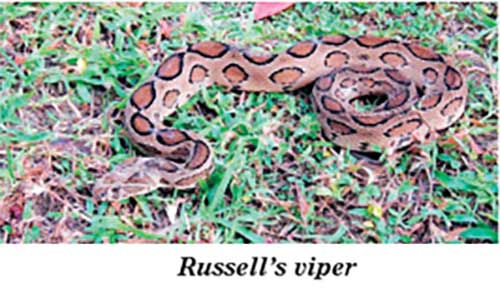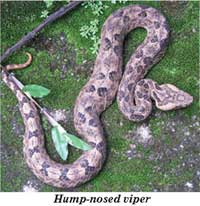News
Peradeniya University awaits Health Ministry nod to launch local anti-serum

By Ifham Nizam
Peradeniya University scientists are awaiting the Health Ministry’s go-ahead to launch the first locally manufactured anti-serum to treat snakes bites.
The University’s Head Professor, Faculty of Veterinary Pathobiology, R. P. V. J. Rajapakse, said that half a dose of the locally produced serum was sufficient to treat snake bite victims
“The preclinical tests have been completed and the level of efficacy was excellent,” he said.
He said an imported dose costs eight US dollars, whereas the local product can be made available at a more competitive price.
Russell’s viper (Daboia russelii), common Krait (Bungarus caeruleus), Hump-nosed viper (Hypnale hypnale), Cobra (Naja naja), Saw-scaled viper (Echis carinatus) and Ceylon krait (Bungarus ceylonicus) are snakes considered “medically important” in Sri Lanka.
 The most common bite is Hump-nosed viper and Ceylon krait, which are highly venomous and found only is Sri Lanka, he said.
The most common bite is Hump-nosed viper and Ceylon krait, which are highly venomous and found only is Sri Lanka, he said.
“Usually, we import anti-serum from India. However, as they produce antivenin using Indian snakes, the toxicity and composition vary from Sri Lankan snake species venom as the Krait and Hump-nosed Viper species are not found there”, he explained.
“Therefore we decided to develop antivenin compatible with our ‘medically important’ snakes in collaboration with an Indian, WHO recommended laboratory”, he noted.
Prof. Rajapakse said that Sri Lanka can even export antivenin to other countries if a WHO recommended bio-safe plant was established under a substantial investment.
The local anti-serum was developed by the Peradeniya University under the guidance of Prof. S. A. M. Kularatne, Senior Professor of Medicine and Senior Scientist Anslem de Silva in collaboration with the Department of Wildlife Conservation, Ministry of Science and Technology.
The government spends around Rs. 1 billion to import anti-venom serum from India, but experts have pointed out that the potency of the venom, particularly when it comes to Russell’s Viper and Hump-nosed Viper in Sri Lanka are more toxic than in India.
Medical experts say that a victim with serious bites suffer acute kidney damage and many other complications when it comes to the hypnale species.
Professors S. A. M. Kularatne, Kolitha Sellahewa, Ariyarani Ariyaratnam, Kalana Maduwage and Dr. Namal Ratnayake from the Teaching Hospital, Ratnapura, have managed several hundred cases of hypnale.
A decade ago, snake bites were a major problem with some 60,000 people falling victim annually. Only around 40,000 of the victims received treatment from hospitals, while the others resorted to traditional native snake bite treatment.
In total, 97% of snake bite deaths are caused by the cobra, Russell’s Viper and Common India Krait. Apart from them, the Sri Lankan Krait and Saw Scaled Viper are categorized as a dangerous species though they have not caused many deaths. The Merrem’s Hump-nosed Viper is considered by the Sri Lanka Medical Association as a deadly species.
However, of the land snakes only a few are ‘medically important’ or can inflict a bite, where the venom could be mild, moderate or highly venomous. It is of interest to note that to date, modern medical literature record human fatalities only due to four species of snakes – Russell’s Viper, Cobra, Kraits and the Hump-nosed Viper.
The Hump-nosed Pit Viper (Hypnale Merrem’s pit viper) is a snake widely distributed in Sri Lanka and the South Western coastal region of India.
It is the most common snake responsible for venomous snakebites in Sri Lanka, estimated to be between 22% to 77% of all snakebites (de Silva, 1981; Seneviratne, 2000). For centuries, it was considered a relatively innocuous snake until 1821, when for the first time, swelling and bleeding due to bites by H. hypnale was reported in animals (Davy, 1821)
News
US sports envoys to Lanka to champion youth development

The U.S. Embassy in Colombo welcomed the U.S. Sports Envoys to Sri Lanka, former National Basketball Association (NBA) and Women’s National Basketball Association (WNBA) players Stephen Howard and Astou Ndiaye, from June 8 through 14.
The Public Diplomacy section of the U.S. Embassy said that it would launch a weeklong basketball program intended to harness the unifying power of sports, made possible through collaboration with Foundation of Goodness and IImpact Hoop Lab.
While in Sri Lanka, Howard and Ndiaye, both retired professional basketball players, will conduct a weeklong program, Hoops for Hope: Bridging Borders through Basketball. The Sports Envoys will lead basketball clinics and exhibition matches and engage in leadership sessions in Colombo and Southern Province for youth aged 14-18 from Northern, Uva, Eastern and Western Provinces, offering skills and leadership training both on and off the court. The U.S. Envoys will also share their expertise with the Sri Lanka Basketball Federation, national coaches, and players, furthering the development of basketball in the country. Beyond the clinics, they will collaborate with Sri Lankan schoolchildren to take part in a community service project in the Colombo area.
“We are so proud to welcome Stephen and Astou as our Sports Envoys to Sri Lanka, to build on the strong people-to-people connections between the United States and Sri Lanka,” said U.S. Ambassador Julie Chung. “The lessons that will be shared by our Sports Envoys – communication, teamwork, resilience, inclusion, and conflict resolution – are essential for leadership development, community building, equality, and peace. The U.S. Sports Envoy program is a testament to our belief that sports can be a powerful tool in promoting peace and unity.”
News
Rahuman questions sudden cancellation of leave of CEB employees

SJB Colombo District MP Mujibur Rahuman in parliament demanded to know from the government the reasons for CEB suspending the leave of all its employees until further notice from Thursday.
MP Rahuman said that the CEB has got an acting General Manager anew and the latter yesterday morning issued a circular suspending leave of all CEB employees with immediate effect until further notice.
“We demand that Minister Kanchana Wijesekera should explain this to the House. This circular was issued while this debate on the new Electricity Amendment Bill was pending. There are many who oppose this Bill. The Minister must tell parliament the reason for the urge to cancel the leave of CEB employees,” the MP said.However, Speaker Mahinda Yapa Abeywardena prevented Minister Wijesekera responding to the query and said that the matter raised by MP Rahuman was not relevant.
News
CIPM successfully concludes 8th Annual Symposium

The Chartered Institute of Personnel Management (CIPM) successfully concluded the 8th Annual CIPM Symposium, which took place on 31st May 2024. Themed “Nurturing the Human Element—Redefining HRM in a Rapidly Changing World,” the symposium underscored the pivotal role of human resource management (HRM) in today’s dynamic global landscape. Since its inception in 1959, CIPM has been dedicated to advancing the HR profession through education, professional development, and advocacy, solidifying its position as Sri Lanka’s leading professional body for HRM.
Ken Vijayakumar, the President of the CIPM, graced the occasion as the chief guest. The symposium commenced with the welcome address by the Chairperson, Prof. Arosha Adikaram, followed by the Web Launch of the Symposium Proceedings and Abstract Book by the CIPM President. The event featured distinguished addresses, including a speech by Chief Guest Ken Vijayakumar, President of CIPM, and an address by Guest of Honor Shakthi Ranatunga, Chief Operating Officer of MAS Holdings Pvt. Ltd., Sri Lanka.
The symposium also featured an inspiring keynote address by Prof. Mario Fernando, Professor of Management and Director of the Centre for Cross Cultural Management (CCCM) at the University of Wollongong, Australia.
Vote of Thanks of the inauguration session was delivered by Dr. Dillanjani Weeratunga, Symposium Co-chair.
The symposium served as a comprehensive platform for researchers to present their findings across a wide range of critical topics in HRM. These included Cultural Diversity and Inclusion, Talent Development and Retention, Ethical Leadership and Corporate Social Responsibility, Adapting to Technological Advancements, Mental Health and Well-being at Work, Global Workforce Challenges, Employee Empowerment, and Reskilling and Upskilling.
The plenary session was led by Prof. Wasantha Rajapakse. Certificates were awarded to the best paper presenters during the valedictory session, followed by a vote of thanks delivered by Kamani Perera, Manager of Research and Development.
The annual symposium of CIPM was a truly inclusive event, attracting a diverse audience that spanned undergraduates, graduates, working professionals, research scholars and lecturers. This widespread interest highlights the symposium’s significance in the field of HRM, offering a unique opportunity for everyone to network and learn from scholarly brains.The CIPM International Research Symposium was sponsored by Hambantota International Port, Sri Lanka Institute of Information Technology (SLIIT), E B Creasy & Co. PLC, and Print Xcel Company.












